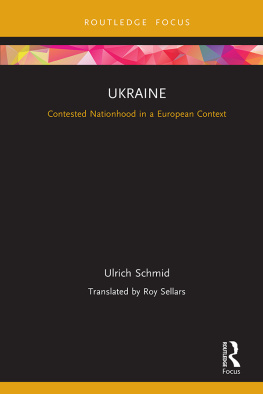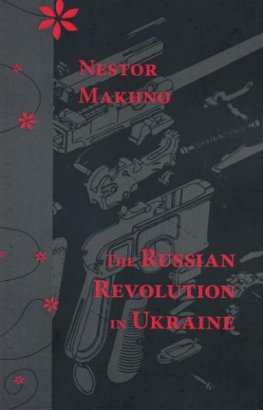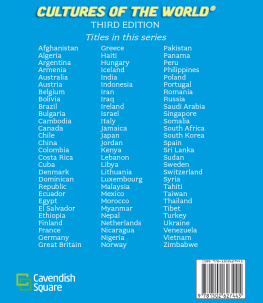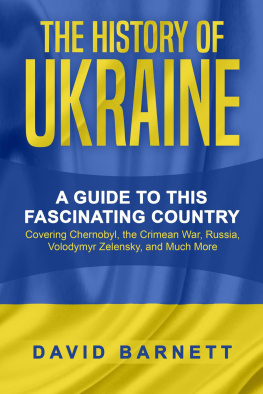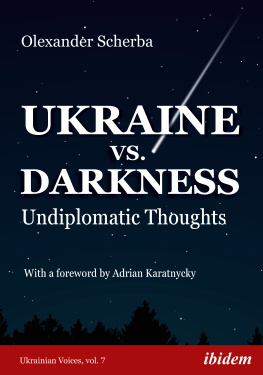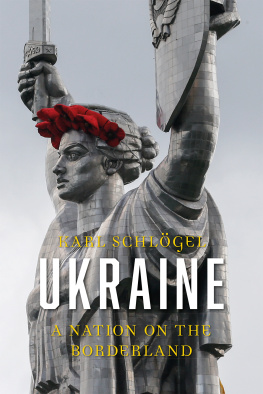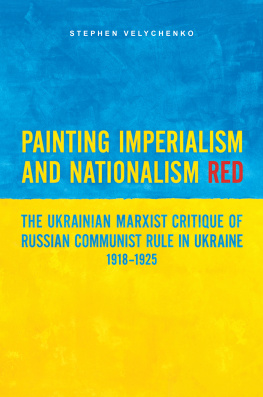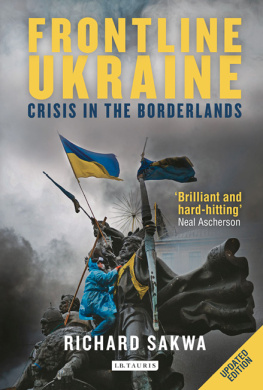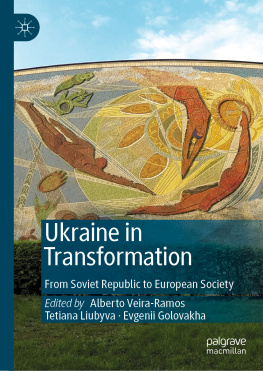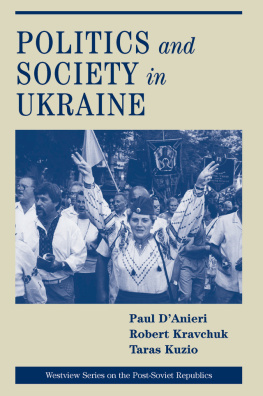Ukraine
Ukraine: Contested Nationhood in a European Context challenges the common view that Ukraine is a country split between a pro-European West and a pro-Russian East. The volume navigates the complicated cultural history of Ukraine and highlights the importance of regional traditions for an understanding of the current political situation. A key feature is the different politics of memory that prevail in each region, such as the Soviet past being presented as either a foreign occupation or a benign socialist project.
The pluralistic culture of Ukraine (in terms of languages, national legacies and religions) forms a nation that faces both internal and external challenges. In order to address this fully, rather than following a merely chronological order, this book examines different interpretations of Ukrainian nationhood that have been especially influential, such as the Russian tradition, the Habsburg past and the Polish connections.
Finally, the book analyses Ukraines political and economic options for the future. Can the desired integration into EU structures overcome the concentration of investment of power in the hands of a few oligarchs and a continuing widespread culture of corruption? Will proposals to join NATO, which garnered robust support among the populace in the aftermath of the Russian aggression, materialise under the current circumstances? Is the political culture in Ukraine sufficiently functional to guarantee democratic procedures and the rule of law?
Ulrich Schmid is Professor of Russian Studies at the University of St Gallen, Switzerland. His research interests include nationalism, popular culture and media in Eastern Europe. He studied German and Slavic literature at the Universities of Zrich, Heidelberg, and Leningrad. He has held academic positions in Basel, Bern, Bochum, and was a visiting researcher at Harvard University, in Warsaw, and in Oslo. His publications include Regionalism without Regions: Reconceptualizing Ukraines Heterogeneity (ed. 2019); De Profundis: On the Failure of the Russian Revolution (ed. 2017); Technologies of the Soul: The Production of Truth in Contemporary Russian Culture (2015); Sword, Eagle and Cross: The Aesthetics of the Nationalist Discourse in Interwar Poland (ed. 2013) and Tolstoi as a Theological Thinker and Critic of the Church (ed. 2013).
Europa Country Perspectives
The Europa Country Perspectives series, from Routledge, examines a wide range of contemporary political, economic, developmental and social issues from areas around the world. Complementing the Europa Regional Surveys of the World series, Europa Country Perspectives is a valuable resource for academics, students, researchers, policymakers, business people and anyone with an interest in current world affairs.
While the Europa World Year Book and its associated Regional Surveys inform on and analyse contemporary economic, political and social developments at the national and regional level, Country Perspectives provide in-depth, country-specific volumes written or edited by specialists in their field, delving into a countrys particular situation. Volumes in the series are not constrained by any particular template, but may explore a countrys recent political, economic, international relations, social, defence, or other issues in order to increase understanding.
Greece in the 21st Century: The Politics and Economics of a Crisis
Edited by Constantine Dimoulas and Vassilis K. Fouskas
The Basque Contention: Ethnicity, Politics, Violence
Ludger Mees
Bolivia: Geopolitics of a Landlocked State
Ronald Bruce St John
The Taiwan Issue: Problems and Prospects
Benjamin Schreer and Andrew T. H. Tan
Ukraine: Contested Nationhood in a European Context
Ulrich Schmid
For more information about this series, please visit: www.routledge.com/Europa-Country-Perspectives/book-series/ECP
First published 2020
by Routledge
2 Park Square, Milton Park, Abingdon, Oxon OX14 4RN
and by Routledge
711 Third Avenue, New York, NY 10017
Routledge is an imprint of the Taylor & Francis Group, an informa business
2020 Ulrich Schmid
The right of Ulrich Schmid to be identified as author of this work has been asserted by him in accordance with sections 77 and 78 of the Copyright, Designs and Patents Act 1988.
All rights reserved. No part of this book may be reprinted or reproduced or utilised in any form or by any electronic, mechanical, or other means, now known or hereafter invented, including photocopying and recording, or in any information storage or retrieval system, without permission in writing from the publishers.
Trademark notice: Product or corporate names may be trademarks or registered trademarks, and are used only for identification and explanation without intent to infringe.
Based on a text originally published in Switzerland as:
Ukraine zwischen Ost und West, by Ulrich Schmid
Ulrich Schmid, 2015, Vontobel-Stiftung
Europa Regional Editor, Eastern Europe, Russia and Central Asia: Dominic Heaney
Editorial Assistant: Lucy Pritchard
British Library Cataloguing-in-Publication Data
A catalogue record for this book is available from the British Library
Library of Congress Cataloging-in-Publication Data
A catalog record has been requested for this book
ISBN: 978-0-367-19980-7 (hbk)
ISBN: 978-0-429-24450-6 (ebk)
In September 2014, I boarded a bus in Koice, the 2013 European Capital of Culture, in eastern Slovakia, and travelled to Uzhhorod, the border town in Ukraine. The distance was 100 kilometres, the fare 7 Euros, and the journey time three and a half hours including a meticulous border control check, lasting nearly an hour. The drivers transactions of his personal business also lasted a considerable time; he mostly delivered paint and varnish at various stops during the journey, thereby supplementing his not particularly attractive wage.
The last village in the European Union, at the border between Slovakia and Ukraine, is called Vyn Nemeck its original name, fittingly, was Oberdeutschdorf. A border post is located there, that, with its military fortifications, recalls Soviet crossing points. The behaviour of the mostly Ukrainian bus passengers also was still determined by Soviet norms. The bus had only just driven into the customs area when a reverential silence set in. The women and men now spoke to each other only in whispers, the bus driver turned off the Slovakian pop radio station and the homogenised American English warbling fell silent. A wondrous change was also noticeable in the drivers choice of language: while in Koice, he had barked in Russian at passengers boarding his bus that they should stow their luggage in the hold, he now spoke in correct Ukrainian with the border officials as he collected the passengers passports. The bus stood in the customs clearance hall for a long time, until finally all the documents had been checked and stamped. We were lucky: on our bus, there were no young Russian men of an age fit for military service. For these young men, entry into Ukraine had been banned since Spring 2014. A change in the ambience also made itself felt; the driver now tuned into a Ukrainian channel that broadcast mostly Russian hits, so-called Popsa.
From the German Heights the road goes directly down to Uzhhorod, which already belongs to the expanded Europe of the 47 member states of the Council of Europe. Just how haphazard and ephemeral the attachment to a nation state can be is clearly evident from the eventful history of this region. Until the First World War, Uzhhorod was called Ungvr and belonged to the Hungarian half of the dual monarchy forming the Habsburg Empire. In 1910, 80 per cent of the towns inhabitants were Hungarian and barely 4 per cent were Ukrainian. The region soon fell into the grinder of the twentieth century. Following the Paris peace treaties, Uzhhorod and the attached Transcarpathia were ascribed to newly independent Czechoslovakia. The authorities did their best to turn Uzhhorod into a Czechoslovak city and built a new administrative district. Many of these buildings were erected under the influence of the so-called Rondocubism which was meant to become the national architectural style of the young state. In the Second World War, the Red Army occupied this territory. Stalin then incorporated Transcarpathia into the Ukrainian Soviet Republic. Ultimately Uzhhorod became, in 1991, the westernmost regional capital of an independent Ukraine. The towns population ratio has been precisely inverted by comparison with 1910: today 77 per cent of the inhabitants of Uzhhorod are Ukrainian while barely 7 per cent are Hungarian.

